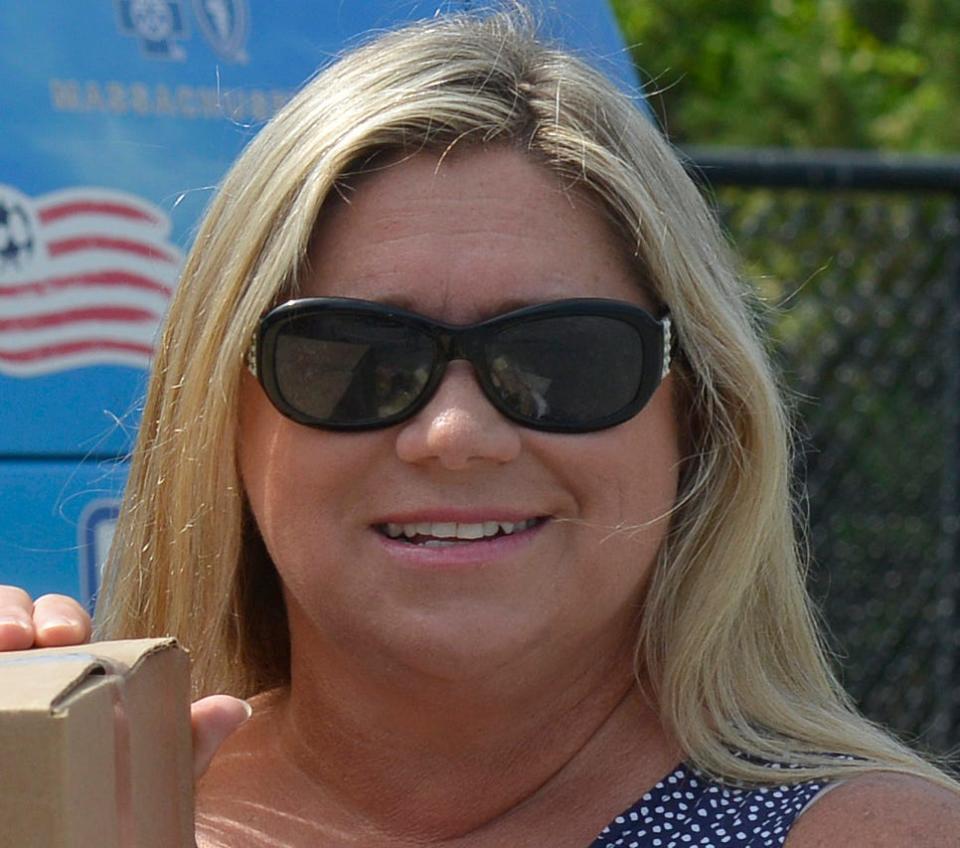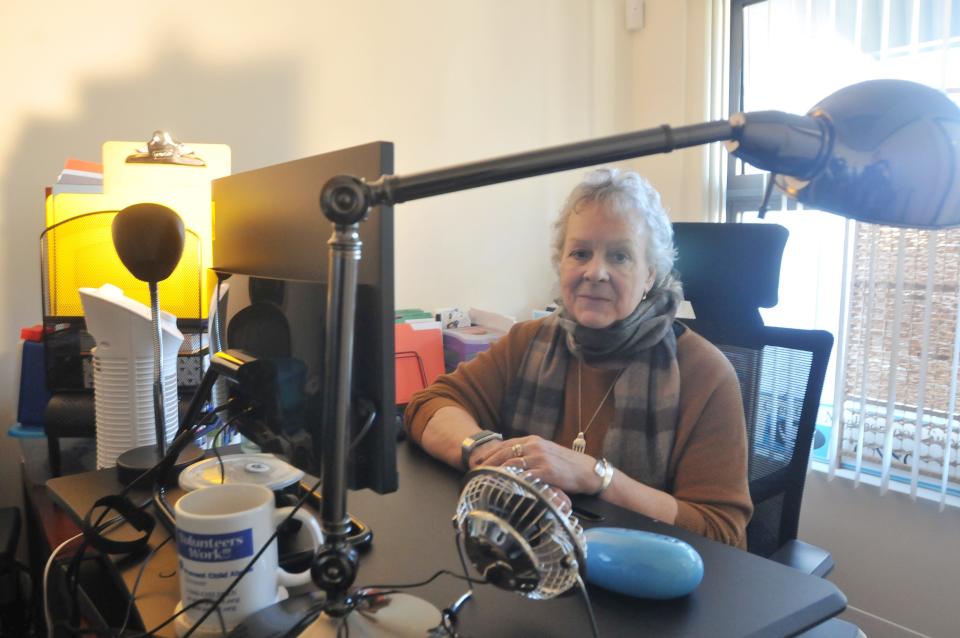'Basic needs.' How are Cape towns planning to spend their $8.3M opioid settlement money?
When Dawn Roche, a Dennis resident, lost her son Trevor in 2018 from a fentanyl overdose, she lost all hope to live.
She took a lot of sleeping pills, Roche said.
But that didn't work.
Over time, Roche started to be more involved in a substance awareness group in Yarmouth and a parent group.
She had found a purpose in life.
“I'm trying to prevent other parents from going through the nightmare that some of us are living,” said Roche. “I started to look for ways to give back and give hope to others.”
Today, Roche is on the Yarmouth Substance Awareness Committee, and a board member for Parents Supporting Parents, a nonprofit.

The opioid settlement fund announced by then-Attorney General Maura Healey in 2021 is a way to help people seeking treatment or any kind of help they need, according to Roche.
The opioid settlement funds represent a $26 billion resolution between several opioid distributors, manufacturers and the 46 participating states. Massachusetts gets more than $500 million in the settlement, according to the 2021 announcement.
The settlement holds liable companies accountable for their roles in the U.S. opioid epidemic, according to the announcement.
The settlement offer was made by opioid manufacturer Janssen Pharmaceuticals, the parent company of Johnson & Johnson, and the “big three" distributors — McKesson, AmerisourceBergen, and Cardinal Health — to resolve their liabilities in opioid crisis-related lawsuits, according to the announcement.
For municipalities in Massachusetts
Each municipality will receive part of that money based on factors like overdose deaths, number of residents with substance abuse disorder, number of opioids prescribed and population.
The 15 towns in Barnstable County will $8.278 million over several years from the Johnson & Johnson and the "big three" distributors settlement, according to the attorney general's office data.
The town of Barnstable is set to receive about $1.8 million — the highest amount among the Cape towns.
Money must be spent on treatment, recovery support and more
The agreement specifies the money must be spent on treatment, recovery support, connecting people to care, harm reduction and services to people involved with the criminal justice system, as well as spent on support for pregnant or parenting women with opioid use disorder and efforts to prevent opioid misuse.
The funds started to flow into municipalities across Massachusetts in June 2022 and each Cape town is currently involved in making decisions regarding the use of the funds.
As of Sept. 15, distributor payment (McKesson, AmerisourceBergen, and Cardinal Health) up to year 3 and Janssen payments (parent company of Johnson & Johnson) up to year 5 has been distributed to the municipalities.
For example, the town of Barnstable received $445,000 in distributor and Janssen payments as of Sept. 15, according to the attorney general's office.
How are Cape towns deciding to spend the money?
“The county has been kind of keeping an eye on what the different towns are doing on Cape Cod and remain available to partner and pool funds to implement these regional approaches,” said Kate Lena, Substance Use Prevention Program Manager for Barnstable County.
County officials are concerned with making sure that the limited funds the county received are being planned to create the biggest impact possible, Lena said.
The goal is to figure out a solid community engagement process — how to make sure that community members with lived experience are genuinely involved in the decision making at the town level and how to spend the funds, according to Lena.
Oftentimes people with lived experience, people who use drugs, people in recovery, and their family members are not invited to the table or not asked for their opinion, she said.
Falmouth’s approach is one the county is watching, Lena said.
Falmouth has set an example
“We designed a format to do some community conversations, the first forum had about 60 people at Saint Barnabas's Church, and we got really great feedback,” said Beverly Costa-Ciavola, the chair of the Falmouth Commission on Substance Abuse.
The town of Falmouth is expected to received about $1.4 million in opioid settlement funds of several years, according to the attorney general's office.
The town ran forums through August with specific populations — one with staff from the school system, one for families who have lost a loved one to addiction, one for families of people in recovery, and then another one for individuals who were in recovery or treatment, according to Costa-Ciavola.

Based on the results of the forums, a proposal was presented Nov. 6 to the Select Board.
The proposal is one the town will be able to revisit in three to five years because the funds are coming in on a 17-year basis, she said.
“We'll be looking at giving maybe a couple of large grant grants, a couple of medium sized ones and then maybe some smaller ones, for startups or for small, smaller nonprofits as well,” said Costa-Ciavola.
Better management of sober living homes was one issue that arose in the forums, Costa-Ciavola said.
Mashpee: First steps in distributing the money
Mashpee — expected to receive $727,000 over several years — already distributed the first round of opioid abatement funds from the settlement. It came from an appropriation of $152,000 at town meeting in May.
Six different agencies with a total of $112,500 received the funding, said Gail Wilson, the human services director for Mashpee.
Duffy Health Center received $22,500; Parents Supporting Parents, a support group for the parents of those struggling with substance use disorder, received $20,000; AIDS Support Group of Cape Cod received $15,000; Behavioral Health Innovators, a nonprofit focusing on substance use disorder and related mental health conditions in teens received $15,000 and One Shared Spirit, a free health and recovery center in Mashpee, received $20,000.
A three-member panel appointed by the town manager reviewed the funding applications, said Wilson. Wilson and Assistant Town Manager Wayne E. Taylor and Corinne J. Wickel of Parents Supporting Parents were part of the panel, which now is expanded to five members.
Each year, the amount of funding has to be approved at town meetings.
“We'll go through the next round of applications in May and then in June we'll be able to afford more of the funding,” said Wilson. “Each of these groups specified how they're going to use the funding and we have a contract with them. We took steps to make this process pretty comprehensive.”
Yarmouth: Choosing to distribute money
Yarmouth also distributed the first round of funding to several organizations, according to Danny Rodrigues, co-chair of the Yarmouth Substance Awareness Committee. The recipients were Yarmouth Comprehensive Treatment Center; AIDS Support Group of Cape Cod; the Alternative Peer Group program serving teens on Cape Cod; and Duffy Health Center.
Yarmouth is expected to receive $275,000 over several years from the settlement, according to the attorney general's office.
“Our goal was to as quickly and mindfully as possible put in an approach where we could get those funds to the organizations that are doing the work,” said Rodrigues. “We had agencies come in to present what their needs were and what they wanted to do with some additional funding. We ended up deciding to focus on the basic needs of our community members where there tend to be a lot of gaps.”
The Yarmouth Substance Awareness Committee also retained some amount from the remediation funds to host events and create materials around prevention, education and promotion around reducing stigma for people with substance use disorder.
What is the Outer Cape doing?
The four Outer Cape towns — Eastham, Wellfleet, Truro and Provincetown — are working together in working groups, according to Emily Beebe, the health and conservation agent for Truro.
In total, Eastham is expected to receive $165,000 in settlement funds. Wellfleet is expected to received $140,000. Truro is slated for $127,000, and Provincetown $188,000, according to the attorney general's office.
Proposals for the programming are being made to each town's Select Board and Board of Health, and by early in the new year the four towns hope to finish that, Beebe said.
The towns have been working with Outer Cape Community Solutions, a network of group organizations "working to improve the health and well-being of residents across the Outer Cape," according to the website. "We're working with all of their network members and that is basically the start of how we will be reaching out to the public," said Beebe.
"We're not trying to create anything new, we're trying to fund the testing efforts and try to support the people already affected by this issue," she said.
It's important to know that the money will be received over a long period of time, Beebe said.
"Planning is very important at this stage to make sure that we're addressing what's happening right now and also try to mitigate the issue over a long period of time. We really want people to feel comfortable in their community, finding help in resources," she said.
At a Provincetown Select Board meeting on Dec. 11, Alex Nelson, the network coordinator for Outer Cape Community Solutions, shared which agencies are currently working on the Outer Cape to figure out how to spend the funds.
“We also have direct partnership with the Truro Police Department and Wellfleet Police Department,” said Nelson at the meeting. “They were active in the meetings, giving feedback all along and this group of agencies has been meeting since January 2023, every month.”
Seeking a detox/rehabilitation center in mid-Cape
Today, Roche believes the Cape needs more mental health facilities, detox centers, rehab centers and other treatment resources.
“What I would love to see is a detox/rehabilitation center in the mid-Cape area, similar to a small setting of a hospital,” said Roche. “The center should also have a safe space for those who are struggling with either mental health and substance use disorders.”
For Roche, the opioid settlement fund is a process of strengthening available resources and a way to soften the stigma of addiction and substance use.
“We're all trying to provide hope and resources so that nobody has to bury their child,” she said.
Rasheek Tabassum Mujib writes about health care and education. Reach herat rmujib@capecodonline.com.
Thanks to our subscribers, who help make this coverage possible. If you are not a subscriber, please consider supporting quality local journalism with a Cape Cod Times subscription. Here are our subscription plans.
This article originally appeared on Cape Cod Times: Cape towns receive opioid settlement based on overdose deaths and more

